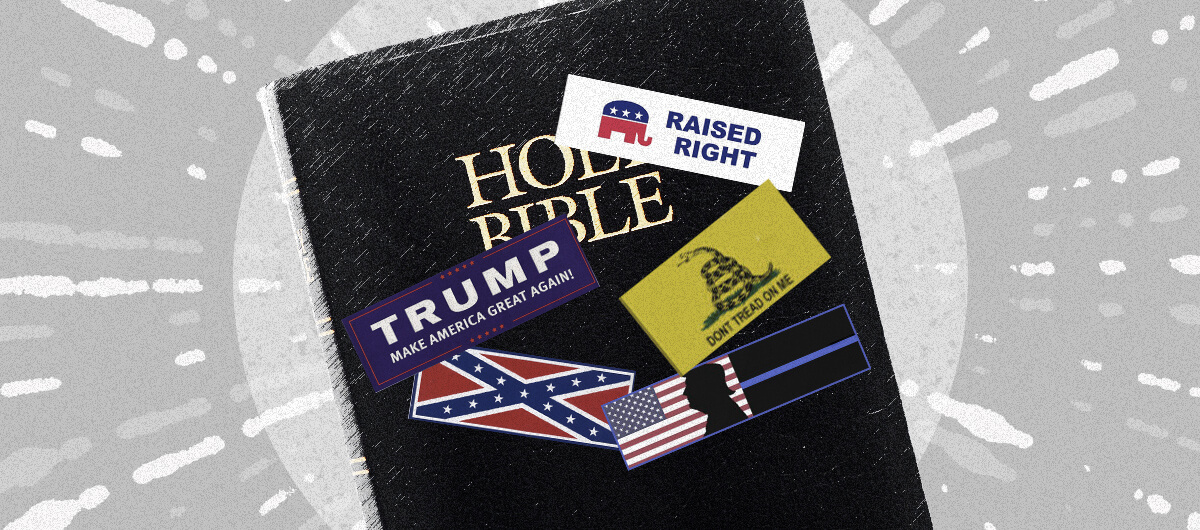

Religion
“Religion” Is Not Good for America
The white, patriarchal Christian Right is trying to shove this country toward a theocratic, autocratic fascist state despite a growing attrition from organized religion.
This article was made possible because of the generous support of DAME members. We urgently need your help to keep publishing. Will you contribute just $5 a month to support our journalism?
Sometime shortly after 9/11, a fellow Lieutenant in the Navy asked me a rhetorical question: If one side believes a conflict is a war over religion and the other one doesn’t, is it a war over religion? This applies to the conflict in the U.S. today between people battling to take America back for their brand of Christianity, versus those ignoring the problem because they consider religion a benign personal matter. If Christian nationalists succeed in establishing permanent anti-democratic control of the government, this difference in opinion will come to a head.
Most Americans are still under the impression that Christianity equals good, no matter what brand they embrace. Nowhere was this more evident than in the screaming match between Representatives Marjorie Taylor Greene (R-GA) and Debbie Dingell (D-MI) on the steps of the Capitol. “You should practice the basic thing you’re taught in church: respect your neighbor,” Dingell yelled. Greene retorted, “Taught in church, are you kidding me? Try being a Christian and supporting life!” Both sides believe that their brand of Christianity is correct and good for America, while failing to acknowledge the population is growing increasingly churchless.
As a result, Americans tend to regard religion, and Christianity, as benign, or a personal matter. In reality, Greene’s brand is the dominant strain within the GOP, and the American landscape at large. There is a false acceptance that more religion would be good for America.
This dogma is evident in the stream of articles lamenting the decline of religion in America, and the rise of people who don’t subscribe to any religion in particular (a.k.a. the nones). These articles worry that without religion, there will be no social glue holding the country together. Behind all of this concern trolling is the assumption that more religion will make things better.
However, each of these assumptions about the effects of religion and the possibility of bringing it back ignores fundamental truths: That “religion,” specifically the dominant brand of conservative Christianity in the U.S., is the force most responsible for tearing the country apart. It’s also most responsible for the country’s plunge toward authoritarianism.
The belief that more religion would be good for the United States is based on three flawed premises. First, religion isn’t glue; it’s more like a box of old, unstable dynamite. Nor is it a social good. The evidence suggests that it makes people meaner, more xenophobic, more anti-vaccine, and more likely to support destroying democracy. Finally, people aren’t going to return to the pews when the vast majority of churches in the U.S. espouse views that most people, much less the “nones,” in the U.S. reject. Even if people were somehow forced back into churches, this wouldn’t solve any of the social ills they claim it would.
There is a strong correlation between religious identity and politics. Social scientists are coming to believe that religion in America is inextricably linked with political identity. It’s a fact that’s been repeated ad nauseam, but Trump’s strongest supporters have been white evangelicals, 81 percent of whom voted for him in 2020. Their support was fervent, and they showed up to vote for him at a rate outstripping other groups. In 2018, white evangelicals were only 18 percent of the population, but 26 percent of the vote.
Pew Research also found a strong correlation between church attendance and voting for Trump that cut across racial and denominational lines. Seventy-one percent of whites who attend church once a month or more voted for Trump, as did 85% of evangelicals. Trump is seen by his supporters as a religious figure, like a modern King Cyrus from the Bible, who will usher in an age of godly dominion over the United States. Religious iconography of Trump abounds within evangelical circles, depicting Jesus literally guiding his hand as he signed legislation. Voting for Trump, and for the GOP, has become a religious commandment among most white Christians in the U.S.; T-shirts with “Jesus is my savior, Trump is my President” were ubiquitous among his supporters.
Recent polling data shows that despite the last four years, the number of people who self-identify as “born again” has increased by ten points. It appears that support for Trump literally is drawing people into a religious identity, rather than the other way around. Trumpism is effectively becoming a sect of Christianity in America, a phenomenon that has had disastrous consequences.
The legal justifications behind the attempt to overturn the 2020 election were drafted by John Eastman, a law professor at Chapman University. He clerked for Justice Clarence Thomas and is chairman of the Federalist Society’s Federalism and Separation of Powers Practice Group. He was also the founder of the National Organization for Marriage, an anti-LGBT hate group. He left his position at Chapman after he spoke at the rally that set off the January 6th insurrection.
The insurrection itself was heavily infused with Christian Nationalist fervor. There were “Jesus Saves” and “Jesus 2020” signs done in the style of Trump campaign banners everywhere. People carried giant crosses and blew shofars as they stormed the capitol on for Trump and God. Jeffrey Goldberg of The Atlantic, who was on the ground on January 6th reported that “the conflation of Trump and Jesus was a common theme at the rally.”
What all of this points to is that religion, in particular American Christianity, is inextricably linked with the GOP. Both groups are working to end democracy in America and establish a de facto single-party state in which separation of church and state are effectively erased. When this happens, they intend for their brand of Christianity to effectively become the state religion, and US law and policy to reflect that. No more abortion. No more birth control. No same-sex marriage. No more LGBT people in the military, or GSAs in schools. But definitely yes to making homosexuality illegal again. They intend to bring back sodomy laws and mandatory prayer in schools (voluntary, non-disruptive individual prayer has always been legal).
Their vision is unacceptable to most Americans, and they know it. That’s why they’re willing to end democracy to get their way. Far from religion being a force uniting the populace and America, it is doing its best to destroy it from within.
As destructive as this relentless drive to enact autocratic theocracy is, the damage that American Christianity does on a social level goes even deeper. The presumption of most Americans is that religion is a social good: Taking your family to church makes them better people, people who attend church are better individuals, and churches themselves improve the community.
None of these assumptions withstands any real scrutiny. On an individual level, studies show that religious people don’t behave differently than the non-religious in their day-to-day activities. Indeed, atheists are only a tenth as likely to go to prison as the public at large. Nor are the religious more likely to come to the aid of a person in distress, even when they think they’re on their way to a lecture about being a Good Samaritan. Others suggest that atheists are more likely to help those in need.
Christians are not more generous in their charity money, either: They give more to churches and less to secular charities than non-Christians. They are likely to show a high degree of in-group favoritism toward other Christians and discriminate against non-believers. Conversely, the studies find that atheists don’t favor atheists, or discriminate against theists. While the religiously affiliated give more to charity, the biggest beneficiaries of that money are churches. Additionally, conservatives and Trump supporters are wealthier than the general public to begin with.
Proponents of religion point to members of churches having better mental health and longer life spans than those who have no religion. However, many of these benefits are confounded with being a part of an in-group, which makes life much more difficult for those in out-groups. In other words, it’s always better to be the bully than the victim. And throughout our history, white evangelicals have wielded the whip, both physically and metaphorically as the dominant social in-group.
What the research does show is that white evangelicals and Catholics are more likely to believe that “reverse discrimination against whites is a bigger problem than discrimination against Black people,” based on polling by the Public Religion Research Institute (PRRI). White evangelicals are also the religious group most likely to hold extremely negative views on immigrants, Muslims, climate change, LGBT people, and atheists. Frequent church attendance actually makes these views worse, not better. They tend to be among the least educated groups in the U.S., and most hostile toward college education. The result is that the least educated people in the U.S. who are incapable of living in a pluralistic society are dominating the political and legal landscape through the political party that they control.
Churches themselves are not a public boon either. In many cases, giving to churches creates no public good at all. The Mormon Church allegedly amassed a dragon’s hoard of over $100 billion from member donations, ostensibly for charity. In reality, little if any of it was spent on the poor and needy, and instead went toward propping up floundering commercial enterprises run by the church. Prosperity Gospel preachers such as Paula White and Creflo Dollar promise people a ticket to heaven if they donate, and spend the money on mansions, $65 million private jets, Lamborghinis, and a lifestyle that would make Liberace blush. Generally, these preachers are drawing donations from parishioners who are among the poor and can scarce afford it.
Even when religious organizations receive public money, they don’t actually serve the public. Instead, the funds benefit only those who believe the same way they do. Homeless shelters run by churches receiving government funds can turn away transgender people, even when refusing them shelter will likely result in death in the Alaskan winter. The Trump administration continued to provide federal dollars to an evangelical adoption agency in South Carolina even though they refuse to place children with Catholic or Jewish families. The result is a system where the government is required to pay churches for services that they only offer to co-religionists due the cases of Trinity Lutheran v. Comer and Fulton v. City of Philadelphia.
Neither does this wealth make churches generous. Joel Osteen, a prominent Trump supporter and famous megachurch pastor, has amassed over $100 million. However, after hurricane Harvey, only when he came under intense public pressure did Osteen open his massive church’s doors to the homeless. The Catholic Church owns one in every six hospitals in the U.S., but health care costs remain staggeringly high.
Even religious private schools are highly problematic. During the ’60s and ’70s many were created to sidestep desegregation orders while trying to maintain tax-exempt status. Many remain nearly all white today. As of 2016, 78 percent of private schools are religiously affiliated. Private schools also charge fees such that only the elite can afford to go there (though, to be fair, the worst offenders are non-denominational). As a result, it can be argued that religious private schools may be a contributing factor to the county’s ever-worsening wealth inequality. In addition, most religious private schools refuse to allow LGBT students, students with LGBT parents, LGBT teachers, or even teachers who support LGBT people in general.
At the same time, some of these schools have served as hunting grounds for predatory clergy. The Catholic Church knew it had a pedophilia problem and covered it up by shuffling the offenders into non-English speaking immigrant communities for decades. Nearly 4,400 priests were found to have been potential abusers between 1950 and 2002, which represents about 4 percent of the Catholic male clergy. Over 1,700 of them remain active and unsupervised as of 2019. The Southern Baptist Convention (the largest mostly white evangelical denomination in the U.S.) also spent decades covering up sexual abuse by moving the abusers from church to church, leaving at least 700 victims in their wake.
Today, though, the damage goes far beyond even private jets and the predations of pedophilic clergy. The engine of today’s anti-vaccine movement is the white evangelical community. Even though vaccination is the surest way to tamp down the COVID-19 pandemic and prevent dangerous new mutations, a recent survey by Pew found that white evangelicals were—by a wide margin—the religious group least likely to get vaccinated. Atheists were the most likely, with 90 percent of them having received at least one dose.
Vaccination rates across counties and states are highly correlated with voting for Trump, and one-third of white evangelicals flatly refuse to vaccinate. In their world where religion and politics are merged, refusing to get vaccinated represents an unshakable tenet of their faith. The result has been a devastating fifth wave of COVID, hundreds of thousands of additional deaths, overwhelmed ICUs, and healthcare workers being threatened constantly to the point of quitting.
As a result of this melding of politics and evangelical conviction that fervor and manliness will protect them from the disease, COVID has now surpassed the 1918 flu as the deadliest pandemic in U.S. history. Despite having a head start on vaccine distribution and making them available at most drugstore chains free of charge, our country now ranks dead last in vaccination rates among G7 countries. It is hard to make a credible case for America needing more religion, when religious people are the ones who most firmly reject behaving in a way that protects the lives and health of their community.
Also, the articles that call for more religion ignore the fact that the young people who have left their churches have zero incentive to return to religious institutions that don’t reflect their values, or the values of most Americans.
An example of this is same-sex marriage. The most recent polling on the subject found that 70 percent of Americans support same-sex marriage. In contrast, only 3 out of the 20 largest religious denominations in the U.S. support same-sex marriage. When you break it down further, those churches’ membership comprises only 7.7 percent of the total U.S. population. The result is a landscape of churches that look far more like GOP Rep. Greene than Democratic Rep. Dingell.
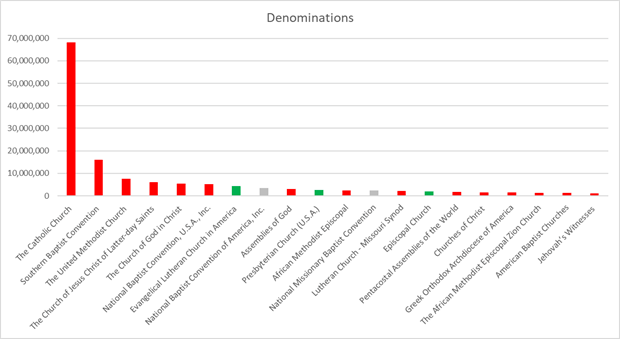
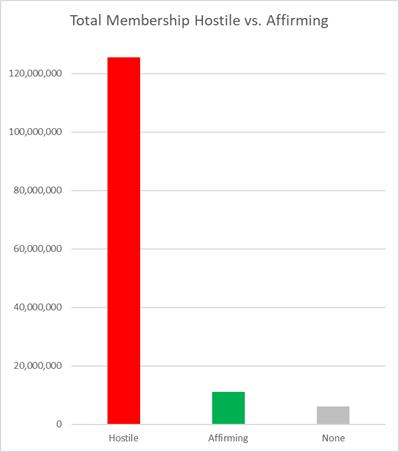
The differing views on same-sex marriage is one of the most extreme examples, but it is indicative of a wider split. Most of these churches are against abortion in most or all cases, while nearly 6 in 10 Americans oppose overturning Roe v. Wade. Teens and 20-somethings who attend private religious schools are more likely than their public school peers to have had an abortion. Catholics are as likely as other Americans to have an abortion. Similarly, though the Catholic Church bans contraception, 99 percent of sexually active members have used it.
The fusion of religion and politics makes it unlikely that churchless Millennials and Gen Z’ers will want to come back. As repeatedly shown, American religion skews heavily to the right. Mainline Protestant denominations that skew toward the center have been in steep decline for decades. Most of the “nones” came from these denominations, speeding their demise. Today, the churchless are a plurality of the American religious landscape; yet the evangelical minority constitutes 50 percent of the GOP, giving them effective veto power over the direction of the party.
On the left, the “nones” are the single largest religious demographic within the Democratic Party. The growth of the “nones” is a generational phenomenon, in which Millennials and Gen Z are the least likely to be religiously affiliated and are becoming less so over time. Younger people also skew heavily Democratic, with 65 percent of Gen Z favoring Biden. It is widely understood that the merger of the GOP with most primarily white Christian denominations in the U.S. has driven less conservative people out. It’s easy to understand why 6 in 10 Millennials raised in a church dropped out and became “nones.”
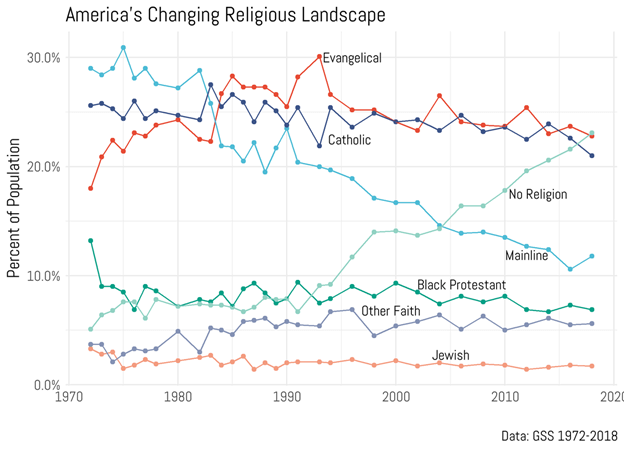
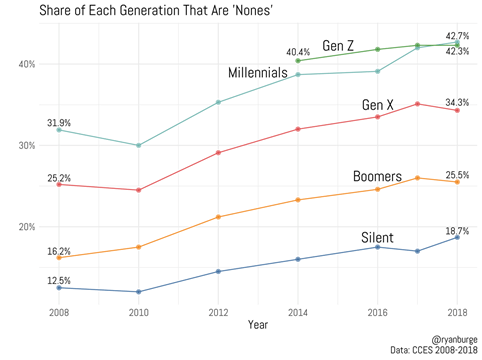
Recent analysis shows that it’s not just white, affluent, college-educated liberals who are leaving the church. There is a broad movement away from religion across generations and education levels. While Republicans are becoming a little less religious, religiously unaffiliated individuals are the single largest demographic within the Democratic party, and growing.
The hope that the religiously unaffiliated will somehow come back to organized religion anytime soon is a pipe dream. The values and politics of most churches are antithetical to most people under 40. The teachings of most churches don’t seem particularly relevant either. There’s zero chance that conservative denominations like the Catholic Church will change their policies, thus drifting further and further away culturally (and becoming even less relevant).
Even the few more liberal denominations aren’t all that enticing. They universally have the oldest congregations. Hanging out on Sundays with a bunch of 60-somethings singing 100-year-old hymns is a tough sell for a 25-year-old who has little in common with that demographic, as well as the option of doing other things instead.
The only way you’re going to get people back into church is if you force them under threat of law. This sounds absurd, but is exactly what some within the Trump wing of the GOP have proposed. Others, like South Dakota Gov. Kristi Noem and Ohio Republican Josh Mandel, have suggested using public schools as de facto churches, believing that “God in classrooms” and school-led prayers would solve all our social problems. Rep. Lauren Boebert (R-CO) stood before a cheering crowd at a rally, waving a Bible and declaring that they should elect “righteous men and women of God” to put churches in charge of the government. Texas Lt. Gov. Dan Patrick blames school shootings on a lack of mandatory prayer in schools.
All this is just the tip of the iceberg: Christian nationalists see God, and prayer, as a panacea for everything. They believe that if everyone worshipped God the way they did, there would be none of this nonsense about LGBT people, abortion, Black Lives Matter, shootings, gangs, drugs, etc. However, research shows that religion has little ability to tamp down unrest among the poor in developed nations, and wealth inequality causes major problems in the US that are only getting worse.
In practice, however, this sort of religious orthodoxy has consistently resulted in higher teen pregnancy rates, textbooks that portray slavery as a necessary evil, a flood of firearms, and abuse of LGBT students by both faculty and peers. There’s nothing to suggest that putting God in schools reduces the number of LGBT students, just the number of them that feel safe coming out of the closet.
There’s also no reason to suggest that putting more God into society would be effective policy, or even feasible. Regardless, that is the underlying assumption of both religious conservatives and the people whingeing over the secularization of the American public. They give no thought to how traditional American religion is the driving force behind both the ongoing destruction of our democracy and the ongoing pandemic. They dismiss the fact that religion isn’t the personal or civic benefit they’d like it to be, and ignore the complete infeasibility of luring younger people back to churches whose beliefs are abhorrent to them, or whose average congregant is collecting social security. Nor is there any thought given to the absolute chaos that would result by instituting the de facto state religion that the GOP base desperately wants.
In an emerging civil war where the divide is primarily religious one side knows who it is, what it wants, and is willing to do anything to get it. The other, oblivious to the nature of the opposition and ignorant of their belief system, is about to find out the hard way what the conflict is really about. We are long overdue for a national reckoning on the destructive role of Christianity in the Christian nationalist movements, and it is coming in the next general election.
Before you go, we hope you’ll consider supporting DAME’s journalism.
Today, just tiny number of corporations and billionaire owners are in control the news we watch and read. That influence shapes our culture and our understanding of the world. But at DAME, we serve as a counterbalance by doing things differently. We’re reader funded, which means our only agenda is to serve our readers. No both sides, no false equivalencies, no billionaire interests. Just our mission to publish the information and reporting that help you navigate the most complex issues we face.
But to keep publishing, stay independent and paywall free for all, we urgently need more support. During our Spring Membership drive, we hope you’ll join the community helping to build a more equitable media landscape with a monthly membership of just $5.00 per month or one-time gift in any amount.
















































































